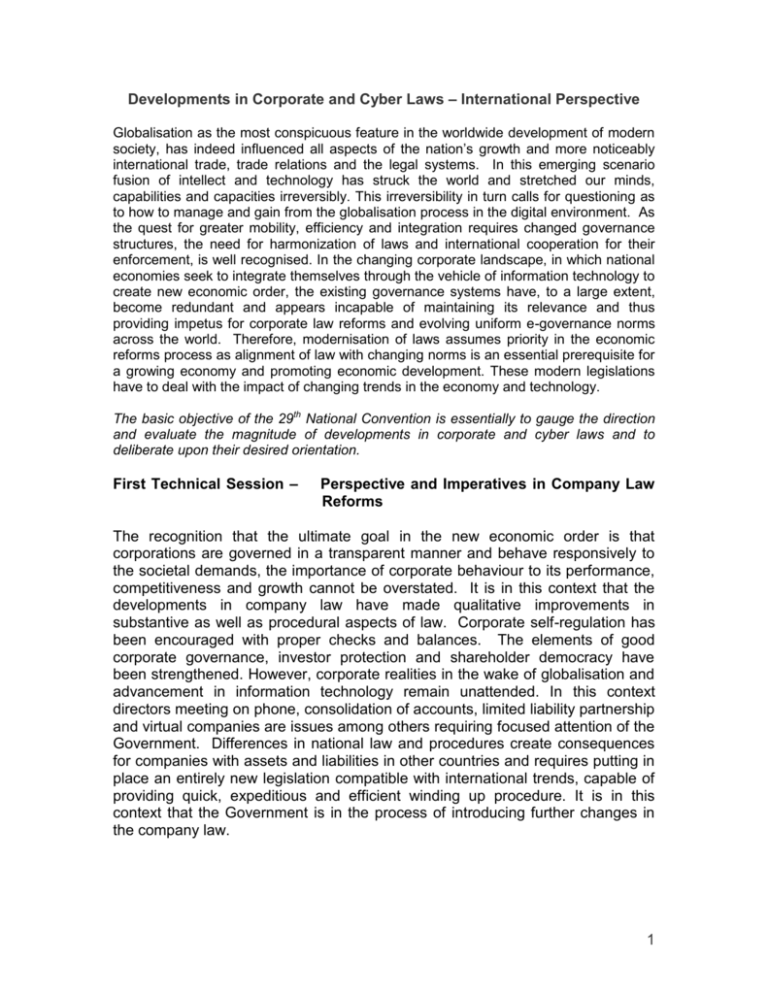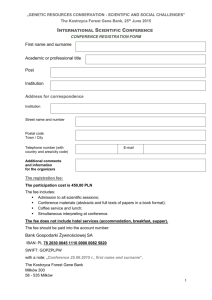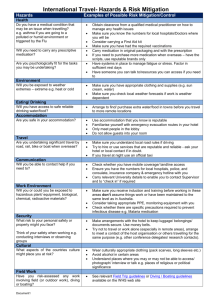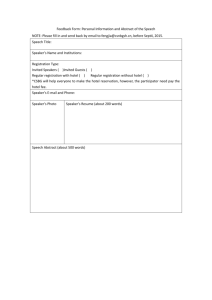Developments in Corporate and Cyber Laws – International
advertisement

Developments in Corporate and Cyber Laws – International Perspective Globalisation as the most conspicuous feature in the worldwide development of modern society, has indeed influenced all aspects of the nation’s growth and more noticeably international trade, trade relations and the legal systems. In this emerging scenario fusion of intellect and technology has struck the world and stretched our minds, capabilities and capacities irreversibly. This irreversibility in turn calls for questioning as to how to manage and gain from the globalisation process in the digital environment. As the quest for greater mobility, efficiency and integration requires changed governance structures, the need for harmonization of laws and international cooperation for their enforcement, is well recognised. In the changing corporate landscape, in which national economies seek to integrate themselves through the vehicle of information technology to create new economic order, the existing governance systems have, to a large extent, become redundant and appears incapable of maintaining its relevance and thus providing impetus for corporate law reforms and evolving uniform e-governance norms across the world. Therefore, modernisation of laws assumes priority in the economic reforms process as alignment of law with changing norms is an essential prerequisite for a growing economy and promoting economic development. These modern legislations have to deal with the impact of changing trends in the economy and technology. The basic objective of the 29th National Convention is essentially to gauge the direction and evaluate the magnitude of developments in corporate and cyber laws and to deliberate upon their desired orientation. First Technical Session – Perspective and Imperatives in Company Law Reforms The recognition that the ultimate goal in the new economic order is that corporations are governed in a transparent manner and behave responsively to the societal demands, the importance of corporate behaviour to its performance, competitiveness and growth cannot be overstated. It is in this context that the developments in company law have made qualitative improvements in substantive as well as procedural aspects of law. Corporate self-regulation has been encouraged with proper checks and balances. The elements of good corporate governance, investor protection and shareholder democracy have been strengthened. However, corporate realities in the wake of globalisation and advancement in information technology remain unattended. In this context directors meeting on phone, consolidation of accounts, limited liability partnership and virtual companies are issues among others requiring focused attention of the Government. Differences in national law and procedures create consequences for companies with assets and liabilities in other countries and requires putting in place an entirely new legislation compatible with international trends, capable of providing quick, expeditious and efficient winding up procedure. It is in this context that the Government is in the process of introducing further changes in the company law. 1 The First Technical Session will discuss in detail the developments in company law and deliberate upon various contemporary issues necessary for better corporate governance structure in an E-enabled environment. Second Technical Session – Financial Market Dynamism and Reforms in Securities Laws Globalisation coupled with open markets and advancement in technology, has made the weakness in capital markets more explicit than ever before, besides placing regulators under tremendous pressures. Thus a competitive market for regulatory regimes challenges not only the international aspects of securities regulation, but also the domestic regulatory aspects to a large extent. Fundamental changes in the regulatory framework are taking place the world over. One of the major reasons for revamping the regulatory framework is the overlapping functions and consequent emergence of over regulations in some areas and under-regulation in others. Empirical evidence shows that these are multiple agencies regulating the functioning of intermediaries and financial markets. Consensus seems to have emerged on the issue of having a unified agency as regulatory authority so as to ensure proper monitoring of the activities of financial system and securities market. In view of these underpinnings, Indian regulators and policy makers should also start contemplating major changes in the regulatory system, drawing from own experiences, including periodic crises, and following major changes in international regulatory experiments. The Second Technical Session will therefore discuss the impact of global integration on Indian financial system and securities market and developments in securities laws to make the integration smooth. The discussion will also focus on the changes taking place in the regulatory framework for financial markets. Third Technical Session – Synchronising Trade Related Laws in WTO Environment Legislative modernisation is required when international developments and domestic economic policy create a demand for new laws. An active law making mechanism can contribute tremendously to the success of economic policy. The Worldwide movement towards open market policies and the expansion of international trade have changed the corporate landscape altogether, requiring Governments to put in place a credible legislative framework to cope with challenges of growing competition, protection of intellectual property rights and mergers, acquitions and combinations and environment. The new economic liberalized order and advancements in technology are two vital spheres of modern society witnessing far-reaching changes, where the character of legislations itself has to undergo change. In this context, it is important to examine how national intellectual property regime should be best designed to benefit the domestic interest and how the international framework for IPRs might be improved and developed to safeguard the interests of developing country. 2 With the opening of trade in goods and services coupled with growing dominance of technology, a new knowledge society is emerging which would be heavily dependent on knowledge, generation, access, protection and utilisation. There is also need for a national strategy to sensitize the innovators, producers and industry on the need for protection of intellectual property rights. There is an imperative need for a balanced and integrated approach to trade and law based on the combination of trade liberalisation, economic development and environmental protection. Thus, this penultimate Technical Session will focus its attention on reforms in trade related laws and charting a future agenda for making them more aligned to emerging new economic order and the economic policies. The Intellectual Property Laws, Competition Bill, mergers, acquisition and combinations will receive added emphasis. Fourth Technical Session – Developing Regulatory Framework for EGovernance Advances in communication and computing and the realisation of the power of internet, as a revolutionary instrument for improving the efficiency and productivity, are perhaps the most powerful paradigm the world has witnessed in the recent times. The speed of change and adaptability to change have become key concern for all concerned. An off shoot of the fast digital revolution is the cyber crimes. Therefore systems should be so designed that the breach of security is reduced to minimum. The conceptual framework for security issues related to legal dimensions. This is where, Governments worldover as well as international organisations are busy devising effective and credible regulatory framework to ensure good governance. The Government is also making efforts to put in place a credible legal framework for internet and cyber space. Information Technology Act, 2000 is operational, However, an adequate and effective legal framework with worldwide perspective is eluding. The legislative efforts need to be supported by technical initiatives, because the answers to various problems, which the regulatory framework may not be able to cope up with, can be found in the machine itself. The technology can also satisfy formal legal requirements by retaining high degree of information security. Therefore, the role of technology itself in evolving mechanism for e-governance has to be considered. It is in this context that the concluding Technical Session will discuss global developments in regulatory framework for internet and cyber space. The discussion will also focus on various aspects of cyber laws in India and the progress on international cooperation. 3 Participants Company directors, secretaries and other senior executives in the corporate and financial services sector, practising professionals in secretarial, financial, legal and management disciplines would benefit from participation in the Convention. Faculty Eminent persons from the Government & industry, including professionals and management experts will address the participants and there would be brainstorming sessions and interactions. Papers received from professional bodies abroad will also be presented in the Convention Papers for Discussion Members who wish to contribute papers for publication in the Souvenir or for circulation at the Conference are requested to send the same preferably in a computer floppy or through E-mail (drs@icsi-India.com.) with one hard copy or those sending only hard copy may send the same in quadruplicate to the Institute before October 15, 2001. Papers should not normally exceed 15 typed pages. There will be considered by a Screening Committee and the decision of the Institute based on the recommendations of the Screening Committee will be final in all respects. Suitable honorarium will be paid for papers selected for circulation at the Convention or for publication in the Souvenir. REGISTRATION PROCEDURE FEE : Members of ICSI/ICAI/ICWAI Non-members Company Secretaries in Practice/Members above 60 years of age Students Foreign delegates Accompanying Spouse Late fee for registration received after November 30,2001 Rs. Rs. Rs. Rs. US$ Rs. Rs. The entire fee is payable in advance and is not refundable for accepted nominations. The registration form duly completed along with a cross demand draft payable at New Delhi for Rs. ______________ per delegate may please be sent in favour of `THE INSTITUTE OF COMPANY SECRETARIES OF INDIA, ICSI HOUSE, 22 INSTITUTIONAL AREA, LODI ROAD, NEW DELHI 110 003 4 before November 20 ,2001 by those requiring hotel accommodation and before November 30, 2001 by those not requiring hotel accommodation. As Hotel accommodation has to be provisionally booked by the Institute subject to confirmation of the same along with necessary deposits, delegate(s) requiring Hotel accommodation through the Institute may please send their requisition(s) for Hotel accommodation along with demand draft for one day's room rent charges in favour of the Institute of Company Secretaries of India so as to reach the Institute on or before November 16, 2001. Hotel accommodation is subject to availability and in case accommodation is not available in the first preference hotel, the delegate(s) will be allotted the same in 2nd/3 rd preference hotel, as given in the hotel requisition forms. Nominations received on or before November 20, 2001 will be send advance copy of the Backgrounder along with pilot papers through post. Nominations received after November 30, 2001 would be accepted alongwith payment of late fee of Rs. 100 per delegate. - For accompanying spouse A registration fee of Rs. _______ may be paid by the delegates for accompanying spouse alongwith his/her registration form and delegate fee to attend lunch, dinner, sight-seeing and cultural programmes of the Conference. \/\/\/\/\/\/\/\/\/\/\/\/\/\/\ 5






